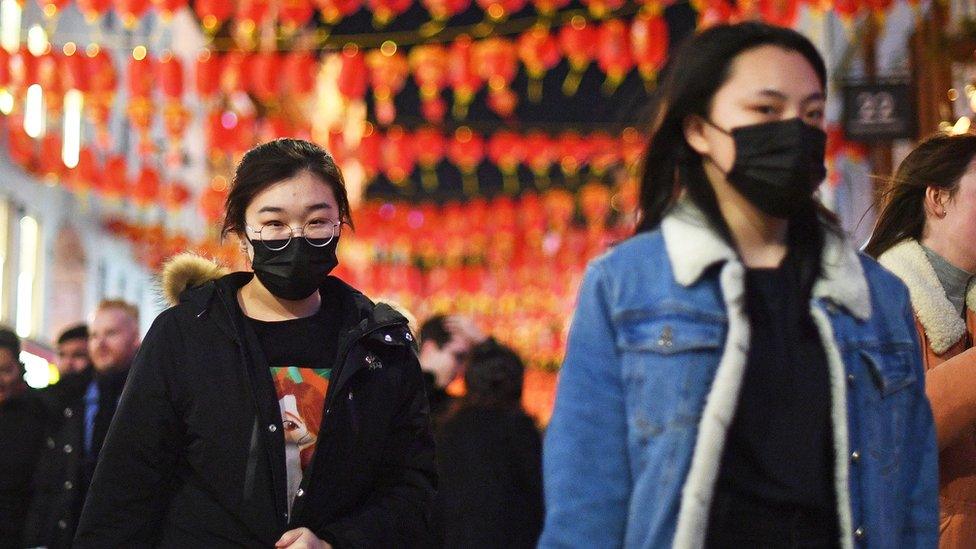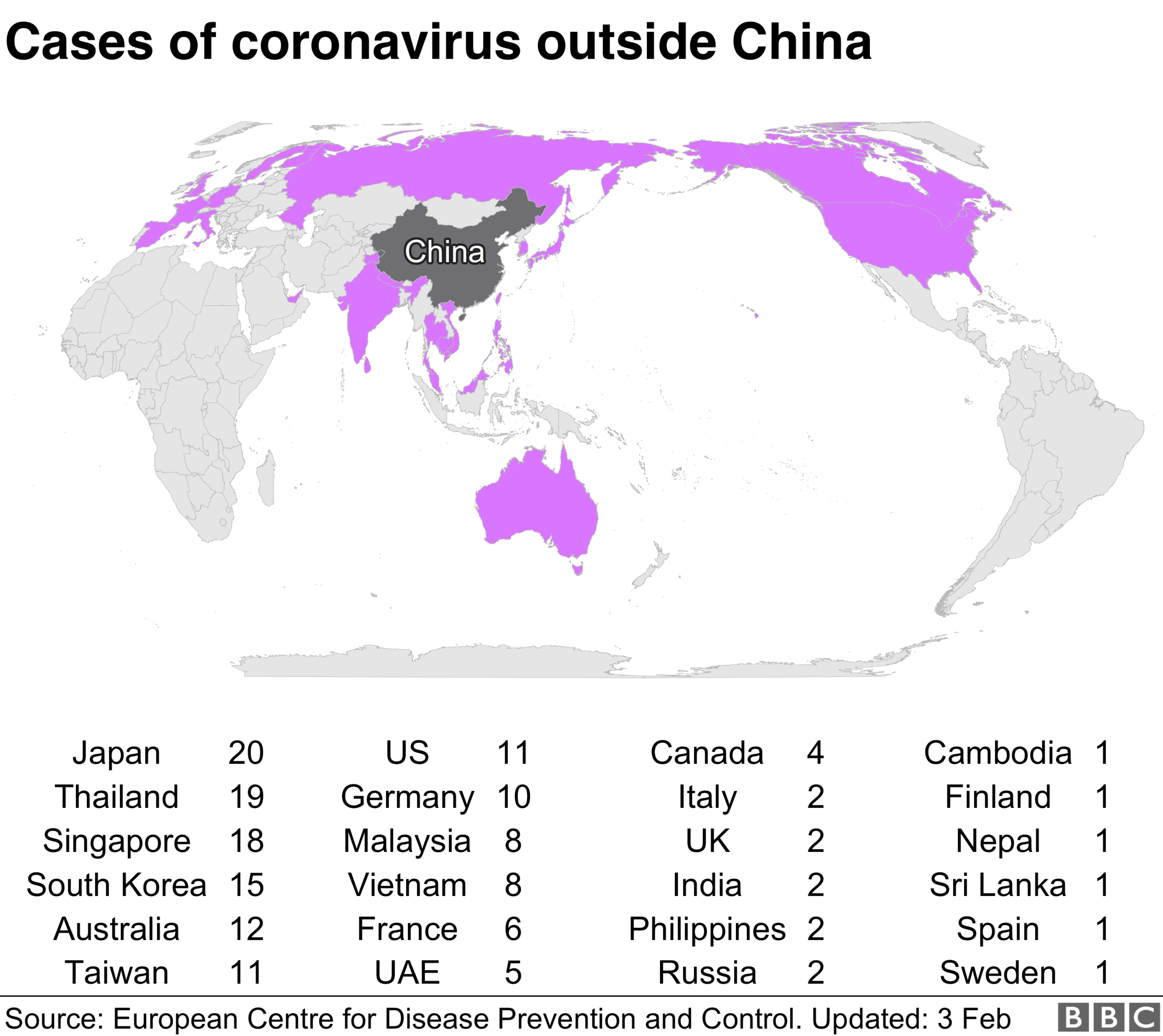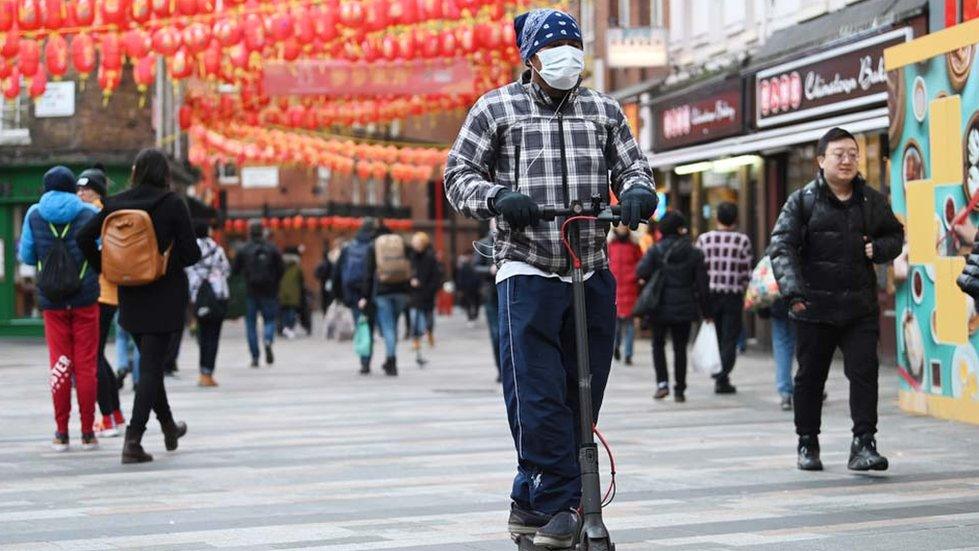Coronavirus will be here for some months, says health secretary
- Published

The new coronavirus "will be with us for at least some months to come", Health Secretary Matt Hancock has said.
He told the House of Commons that the number of new cases worldwide was "doubling every five days" and dealing with it was "a marathon, not a sprint".
A second evacuation flight for British nationals arrived back in the UK on Sunday from Wuhan in China.
One of the 11 passengers was taken to hospital for tests after feeling unwell, but later said he felt "fine".
There have so far been more than 17,000 confirmed cases of the virus in China. Some 361 people have died there.
Outside China, there are more than 150 confirmed cases of the virus - and one death, in the Philippines.
There have been two confirmed cases of the virus in the UK, where two Chinese nationals - a University of York student and one of their relatives - are being treated in the specialist infectious diseases unit at Newcastle's Royal Victoria Infirmary.
The UK authorities have so far overseen two evacuation flights of UK nationals from China.
The first group arrived in the UK on Friday and are spending two weeks in quarantine in two apartment blocks normally used to house nurses.
The second group landed at RAF Brize Norton, Oxfordshire, on Sunday evening, after returning from Wuhan - the centre of the outbreak - via Marseille, in France.
Passenger Anthony May-Smith, who was on the second flight, told Sky News he was put into isolation after landing because of a cough and sore throat and was waiting for test results to come back on Tuesday.
He added: "I feel fine now, I think it's probably the stress of getting back and being run down more than anything."
Mr May-Smith is being looked after in Oxford, while the other 10 passengers were taken to Arrowe Park Hospital in Wirral, joining 83 other people evacuated last week.
A Wirral Council statement said: "None of the other new arrivals have shown any symptoms, but as a precautionary measure they were allocated rooms in a separate area of the facility, isolated from those already there."


The virus can cause severe acute respiratory infection and symptoms seem to start with a fever, followed by a dry cough.
A British man living in Wuhan has told how he recovered from the virus and plans to stay in the Chinese city.
Teacher Connor Reed, 25, from Llandudno in north Wales, contracted the virus last December but initially thought it was a cold.
"It sounded like I was breathing through a paper bag. And it was at that point that I thought, OK this is serious," he told BBC Radio 4's PM programme.
"I went to the hospital and they did a whole manner of tests over the course of two days.
"Once the results came back they said, 'yes you've got an infection and you should go home and rest'. And they gave me a Ventolin inhaler which worked really, really well."
Mr Reed said he planned to stay in Wuhan despite agreeing that it looked like a ghost town
"I consciously decided to stay just because I think it's the right thing to do," he added.
500 beds available
Mr Hancock told the Commons that analysis from Public Health England of the two cases in the UK suggested the virus had not evolved in the last month.
He said that if the situation in the UK was to get "much more serious", there were 50 "highly specialist beds" available and a further 500 beds available for isolation.
The Department of Health said that as of Monday afternoon a total of 324 people had tested negative from 326 tests in the UK.


The British embassy in Beijing tweeted, external on Monday that it was working hard to get seats for British nationals on a number of new flights this week out of Hubei province, where the virus originated.
The statement said they "may be the last flights for foreign nationals out of Hubei" and urged any British nationals to get in touch if they wanted to travel.
Mr Hancock said there were no plans to evacuate all remaining UK nationals in China.
"There's an estimated 30,000 UK nationals in China, and the proportion of the population who have the virus outside of Wuhan is much lower than in Wuhan itself."
'Not recommending' face masks
He added that the government had launched a public information campaign setting out how members of the public can help by "taking simple steps to minimise the risk to themselves and their families".
"Washing hands, using tissues when you sneeze, just as you would with flu."
And, asked if face masks work, Mr Hancock said: "There are circumstances in which they work, but we are not recommending them for people generally to wear.
"But, of course, it's a free country."
Last week, the risk level to the UK was raised from low to moderate as the World Health Organization declared an international public health emergency.
But health professionals say the risk to individuals getting the illness in the UK remains "low". , external
The UK government has donated £20m towards a plan to produce a vaccine to combat the virus.
The money will go to CEPI - the Coalition for Epidemic Preparedness Innovations - a global body aiming to fast-track a vaccine within six to eight months.
Meanwhile, China's top leadership has admitted "shortcomings and deficiencies" in the country's response to the deadly outbreak.
- Published3 February 2020
